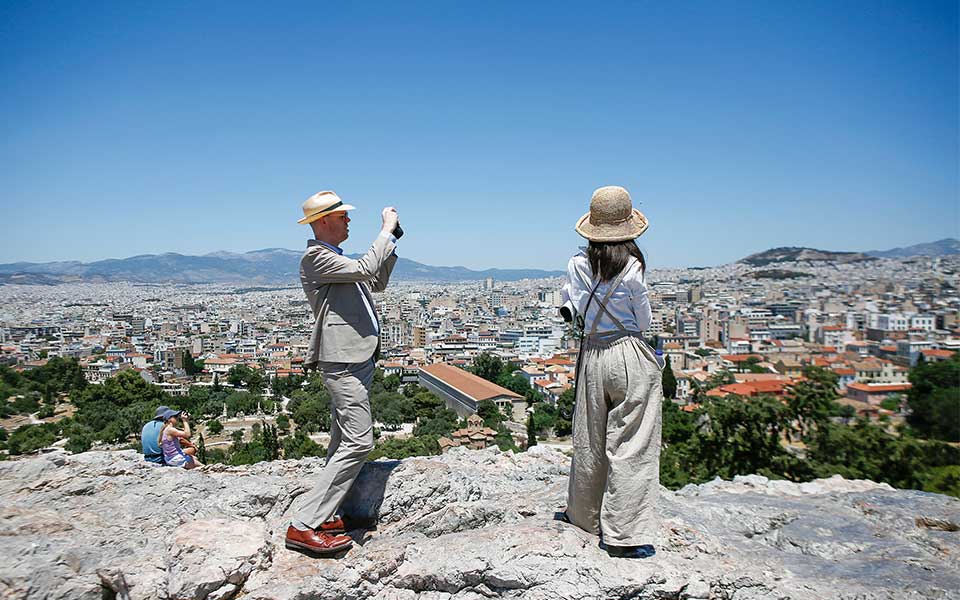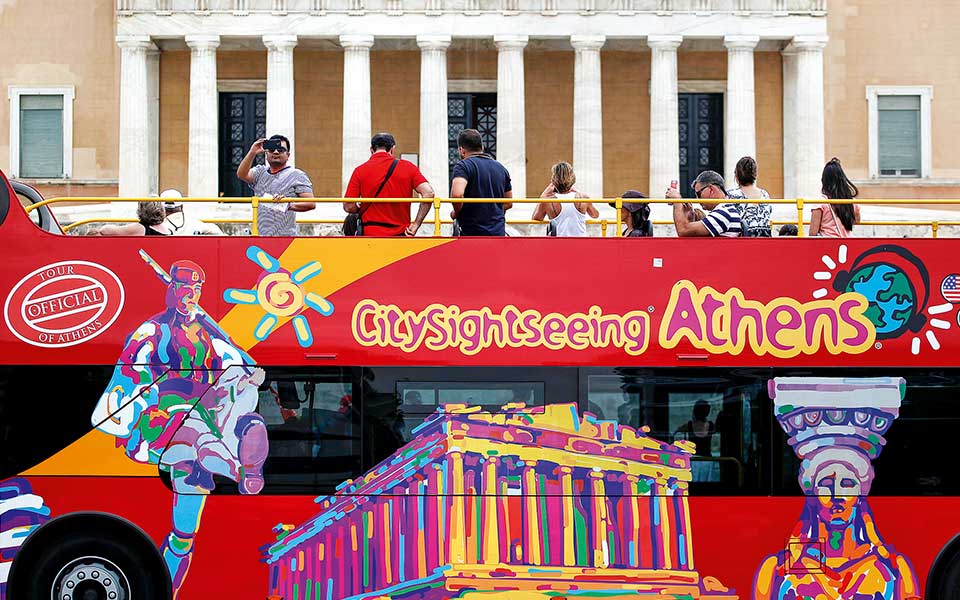There’s no doubt about it – Athens is booming right now. A selection of breathless articles in international publications have declared the city “the new Berlin,” heaping praise on its growing art and food scenes. And it’s attracting tourists like never before. The city welcomed 5.5 million overnight guests in 2018 – its biggest-ever number.
Tourism makes up almost a quarter of Greek GDP, so it would be easy to assume that locals are celebrating this rise. However, not everyone is happy. In areas such as Metaxourgeio and Kypseli, which are growing in popularity with international artists and travelers, you may spot anti-tourism graffiti. Residents complain about unfair rent increases and tell stories of families being forced to leave because landlords want to turn their apartments into Airbnbs. As other European cities such as Barcelona and Amsterdam protest about an overload of visitors on their streets, could Athens be about to run into similar problems?
“I think Athens is still very welcoming as a city,” says Theofilos Kyratsoulis, general manager of tourism marketing agency Mindhaus, who has been very vocal about the need for more investment in tourism. “From both a professional perspective and as a resident, I don’t really see there is an issue – especially in comparison with other destinations.” However, he admits that the increase in short-term rentals on platforms such as Airbnb may be affecting the rental market. “If you’re looking for an apartment, you can see the rents going up,” he says. “It’s a challenge for destinations everywhere.”
Kyratsoulis explains that there has been a big push over the past few years to market Athens as a destination, in large part by the official This is Athens campaign; a coalition between the City of Athens, the Greek Tourism Confederation, Athens International Airport, Aegean Airlines and various hotel owners and investors. “Athens is no longer a stopover on the way to the islands, it’s a city break destination in its own right,” he says. “We’re just getting close to what other countries have been doing for the past 20 years.”

© Amna/Yannis Kolesidis
But as the Athens hype continues to grow – just this summer, Harper’s Bazaar UK declared that it has one of Europe’s most exciting “rising art scenes” – Kyratsoulis believes it’s essential that this city takes measures to stop the tourist boom causing too many problems.”It’s great timing right now to take the steps to make sure becoming a destination doesn’t impact on residents’ quality of life,” he says, warning that infrastructure can become overloaded when visitor flows are not managed.
Much of the discussion about overtourism and Airbnb saturation in Athens has centered on the neighborhood of Koukaki. Its proximity to the Acropolis has seen it explode in popularity over the past few years, and in 2016 it was named by Airbnb as one of its top 10 growth neighborhoods in the world. Data from 2017 suggested there were 343 listings on the rental site in the district – a huge number considering it is a relatively small area. Rents in the neighborhood are said to have more than doubled, and many long-term residents have been forced to move elsewhere.
“It’s good that tourists come here and want to see our culture,” says Andreas Maragos, owner of the bar O Babas just off the main strip in Koukaki. “I like how they want to learn about Greek microbreweries, Greek wine and Greek cuisine. They’re always very kind. But we don’t have a neighborhood anymore.”
Andreas reflects on how, when he first opened in 2013, his clientele mostly consisted of students. Now, they’ve been forced to move elsewhere, and he mainly deals with tourists. “We don’t have many people coming in here in winter,” he explains. “I’d like it to be around 50/50 tourists and locals, or even 60/40. Now it’s usually around 70/30.”
Around the corner at the bar Kolokitha, Kostas Theodorou is more relaxed about the situation. “We’re a tourist area, so why not?” he says. “Some parts of Athens have no visitors at all.” But even though his business is benefiting from an increase in customers, he admits he is seeing the downside on a personal level. “You can’t find anything to rent around here now – I’m looking myself at the moment,” he says. “It used to be around €300 a month for an apartment. Now, if you can even find one, you’re going to have to pay €1,000.”

© Dimitris Tsoumplekas
And it’s not just rental prices that have been impacted – the prevalence of Airbnb-listed properties in the area has affected how many businesses operate. Sofia Alexaki, who runs a mini-market on Veikou Street, was born in the area and says she has seen it change dramatically. As she says, “The residents are no longer residents. I have stopped having steady customers. In some ways it’s better, and in some ways it’s worse. I’m on the verge of changing my products because tourists are asking me for things that Greeks don’t.”
She explains she’s currently trying to source mini bottles of shampoo and shower gel to sell, as she’s asked for these so frequently. “But it’s difficult when you don’t have steady customers and a steady income,” she adds. “I don’t know what will happen in the winter – I might bring in a lot of products and then find they don’t sell.”
She also reveals that she, too, has been forced out of the area due to rent increases – last summer she moved to Nea Smyrni. “I purchased this business because I lived in the area, and now I have to take the bus here,” she says. “I can’t stay open the number of hours I used to.” However, she is against the idea that some kind of control should be introduced for Airbnbs: “I don’t think that would be effective in any way – the owners have the right to do what they want with their apartments.”
Tonia Katerini from the United Initiative Against Auctions is one Athens resident working to raise awareness of the situation. Although her organization was originally set up to help Greeks facing eviction due to indebtedness, she says they’re now dealing with an increase in cases of people being forced from their homes due to Airbnb-related rent hikes. “Over the past three years, we’ve seen many people forced to change the neighborhood they live in, especially in Exarchia and Koukaki,” she says. “Usually, it’s because the owners are asking for more money.”

© Shutterstock
Katerini and her colleagues have begun handing out pamphlets on the streets of Koukaki, campaigning against the rise of short-term rentals. “It was very interesting speaking to people,” she says. “About 70 percent were very upset about the out-of-control tourism in the area. Twenty percent were in favor of Airbnb and said the money was essential for their lives.” She adds that these Airbnb property owners were keen to point out the difference between themselves – families that rent out one property – and large companies that manage multiple apartments.
Although Airbnb was launched as part of the so-called “sharing economy,” under the premise that homeowners would rent out a single room in their house or apartment, or the whole property while they were away, it has grown into something far bigger than that. According to 2017 data, commercial operators that control multiple properties are responsible for 43.8 percent of Athens’ Airbnb listings. The biggest of them all, Mint, has more than 150.
One Athens resident who has made a full-time career from Airbnb is Rowan Wood, who is originally from Los Angeles but moved here in 2013. His company, Athena Vaca, has 11 apartments it leases itself and five that it manages for other owners. Wood is quick to defend his trade. “I think the owner has the right to do whatever they want with their property and that should be the end of the story,” he says. “We don’t have this conversation when someone wants to buy a car, for example.”
He also does not hold much sympathy for those concerned about the fabric of their neighborhoods changing. “I think it’s the natural evolution of a city,” he explains. “I think it’s very conservative to want to maintain a neighborhood exactly the way it was in the past. I don’t see bohemian people who are against wealthier people moving into their area as any different to those in the southern states of the US who don’t want black people or gay couples living on their street. You can’t stop the movement of people and you can’t stop change happening. It’s like disrupting the flow of a river.”

© Dimitris Tsoumplekas
Wood adds that most of his clients are “ordinary homeowners” rather than members of the super-rich, and uses the “trickle-down” economic theory to justify their right to make money from their properties: “If they’re making more money then they’re going to be spending more money and giving more money to their children,” he says. He also points out that the large number of empty properties in the center of Athens may be contributing to rent increases: “You can’t just blame Airbnb owners; it’s more complicated than that.”
Stratos Paradias, president of the property owners’ association POMIDA, says rental increases in central Athens are not due to just Airbnb. “Rents went down in the crisis and now some kind of recovery is taking place,” he says. He also adds that no new apartments have been constructed in the past decade – leading to a shortage of supply – and that he believes most buildings converted into Airbnbs are ones that were previously empty.
Most people that Greece Is spoke to for this story were in favor of some kind of control being introduced, while still recognizing that tourism is an essential component of the Greek economy. “I think we should try to monitor the districts and make sure their character doesn’t change,” says Kyratsoulis. He also believes that different neighborhoods and aspects of Athens should be promoted, in order to spread visitors out and avoid congestion. “I’d like to see our infrastructure improved, too; both for tourists and residents,” he adds.
Katerini says she’d rather see short-term rentals being listed on more ethically focused platforms, such as Fairbnb.coop, which promises to give back 50 percent of its profits to community projects, including social housing. “I think there has to be a control on the overcrowded Airbnb areas – there has to be a limit,” she says. “We should also have a simple license for people who want to rent out Airbnbs. They should declare it to the municipality.”
However, Wood believes that the number of Airbnbs in the city may be about to drop anyway – and not because of any new laws. “The market’s become incredibly crowded,” he says. “I’ve seen prices drop drastically. I believe a lot of people are starting to have trouble renting their Airbnbs if they are outside the ‘golden circle’ around the Acropolis, and they’re definitely not going to make the money that they fantasize about. I get 10 to 20 calls a day from people and I have to tell them their properties just don’t have Airbnb viability.” Paradias adds that the new tax laws will make Airbnbs less profitable.
Given the extra costs and work involved with running an Airbnb, might owners simply give up on the idea and go back to renting to long-term tenants? Wood says: “I think a lot of people are going to leave the market in the next year.”
Globally, tourism is on the rise; there were 1.4 billion international travelers last year, a new record. Greece in general and Athens in particular have been major beneficiaries, with visitor numbers rising annually. Both the new mayor of Athens and the government have identified tourism as a priority economic sector. However, it remains to be seen whether Athens can avoid the problems and the discontent witnessed in other European capitals.












